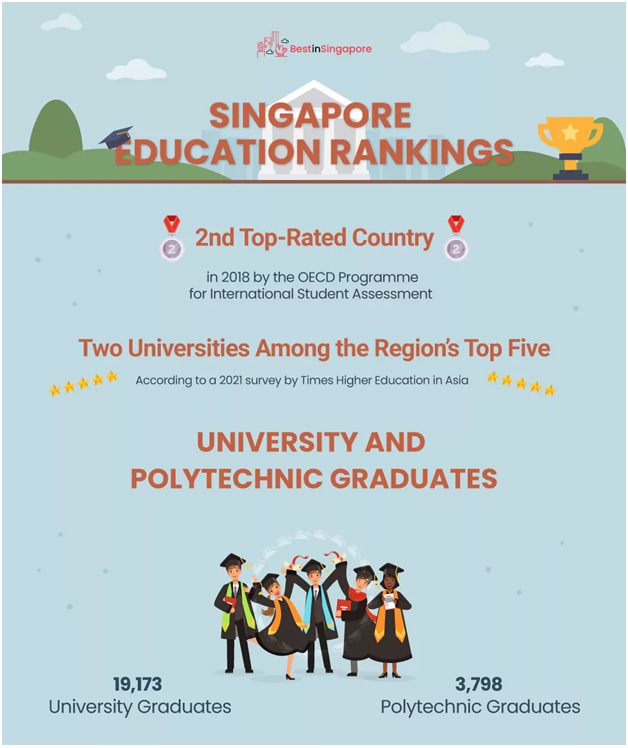Become A Successful Teacher In Singapore: Important Factors To Know Before Starting Your Teaching Journey
1st August 2023

Teaching is considered one of the noblest professions, which gives the opportunity to make a positive impact on the student’s life, which leads to shaping the future generation towards a better future. Becoming a teacher is noble and it’s also a rewarding career as well if you’re thinking of teaching in Singapore. According to bestinsingapore.co, it’s considered to be the 2nd Top-rated country in 2018 by the OECD Programme for International Assessment, and it also tops the education quality index country-wise as well.

Source: www.bestinsingapore.co/singapore-education-statistics/
Singapore has become one of the popular destinations for aspiring and experienced teachers who have pursued courses like Teacher Training Course in Singapore and have the desire to build a teaching career over there.
However, before taking the decision to teach in Singapore, it’s best to every single detail with which should be aware before teaching in Singapore and for that reason, we have created this blog post.
Before moving to the topic, can we ask you a question? Do you follow us on Social Media? We regularly share upgraded educational content, tips, feedback and more. Check us out by clicking the profiles here – Facebook / Twitter / LinkedIn / Pinterest / Instagram / YouTube
So, without any further delay, let’s get started.
What are some useful things to know about teaching in Singapore?
1. Degree Criteria
In order to teach in almost any foreign country you need to have a four years college degree or Bachelors in any specific field, you can also pursue advance degrees in your field or in education field for better opportunity.
However, if your ambition is high and you wanted a position related to administration or leader level in the private school then a Master’s or Doctorate degree would be more preferable.
2. Proficiency Level of English
English is the primary language of instruction in Singapore schools. Therefore, it is crucial for teachers to have a high level of proficiency in English. This includes both spoken and written communication skills. Teachers are expected to be able to effectively communicate complex ideas and concepts to students, as well as provide clear instructions and feedback. Being fluent in English will also help teachers in their day-to-day interactions with students, parents, and colleagues.
3. Value of Certificate
There’s no necessity to acquire certification to get hired in a teaching position. However, if you decide to hone your teaching skills in a particular field then upgrading yourself by getting the certificate will increase the chance of getting a good job. Like- If you planned to decide Teaching English as a Second Language then obtaining a TEFL certificate will prove to be more beneficial.
Many educators might earn certification in their specialized field which will help them to stand out during the hiring process.
Must Have Skills for Teachers
To excel as a teacher, it's important to develop a range of skills that will help you create an engaging learning experience for your students. Here are some essential skills for teaching:
1. Communication
Effective communication is a fundamental skill for any teacher. Being able to convey information clearly and concisely is essential for ensuring that students understand the concepts being taught. Verbal and non-verbal communication techniques can help engage students at different learning stages.
2. Patience
Teaching requires a patient mindset, particularly when working with students of different abilities and learning styles. Patience allows you to create a supportive and inclusive classroom environment where every student feels valued and understood.
3. Time Management
Teaching involves a multitude of tasks, from lesson planning to grading assignments. Effective time management skills are crucial for staying organized and ensuring that each aspect of teaching receives sufficient attention. Problem-solving skills can also help address any challenges that arise during class.
4. Adaptability
As an educator, it's important to be adaptable and flexible in your teaching approach. Recognizing that each student learns differently and adjusting your methods accordingly can enhance the learning experience for all students.
5. Passion for Learning
A genuine passion for learning can inspire students and create a positive classroom environment. Demonstrating enthusiasm for the subjects you teach can help foster a love for learning among your students.
6. Creativity
Incorporating creative teaching methods and resources can make lessons more engaging and memorable. Thinking outside the box and using innovative approaches can help students develop critical thinking and problem-solving skills.
7. Empathy
Having empathy allows you to understand and connect with your students on a deeper level. By putting yourself in their shoes, you can better support their individual needs and create a safe and inclusive learning environment.
8. Collaboration
Collaboration with colleagues, parents, and other stakeholders is essential for effective teaching. By working together, teachers can share ideas, resources, and best practices to enhance the overall learning experience for their students.
9. Continuous Professional Development
Teaching is a lifelong learning journey. Engaging in continuous professional development through workshops, conferences, and further education opportunities helps teachers stay updated with the latest pedagogical approaches and enhances their teaching skills.
10. Technology Integration
In today's digital age, incorporating technology into teaching can enhance the learning experience. Embracing educational technology tools and platforms can help create interactive and immersive lessons that cater to different learning styles.
Academic Year in Singapore
In Singapore, the academic year typically starts in January and is divided into two semesters. Each semester consists of around 20 weeks of teaching, followed by a break. The school day usually starts around 7:30 am and ends around 1:30 pm.
However, teachers are expected to arrive earlier and stay later to prepare lessons, grade assignments, and attend meetings. In addition to regular classroom teaching, teachers are also involved in co-curricular activities and school events. It is important to note that the workload can be demanding, but the rewarding nature of the profession makes it worthwhile.
How You Can Apply For a Teaching Job?
To apply for a teaching job in Singapore, you can start by exploring job portals and websites that specialize in education recruitment. The Ministry of Education in Singapore also has a dedicated portal for job seekers in the education sector. When applying, it is important to prepare a comprehensive resume highlighting your qualifications, teaching experience, and any relevant certifications.
Additionally, you may be required to submit a statement of purpose or teaching philosophy, as well as provide references from previous employers or supervisors. It is advisable to tailor your application to the specific requirements and preferences of the school or institution you are applying to.
Is teaching in Singapore right for you?
Those individual who have chooses to become teacher have one thing in common that they are passionate about changing student’s life for better by giving them best possible education. Teaching profession can be rewarding as well if you choose to teaching Singapore, and it’s especially true for those who have pursued courses like Teacher Training Course in Singapore.
However, before embarking your teaching journey in Singapore, you must know certain factors to grow your teaching career effectively and you can get to know those factors in details, which is mentioned above.
We believe education should be accessible for everyone. That’s why we don’t charge for our blogs. Find the right course that will help you in your career with us, contact us at 65-3163-1068 or WhatsApp us at +66-81-262-8832. You can also mail us at asiancollegeofteachers@gmail.com.











